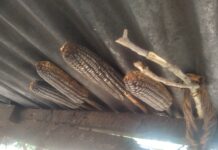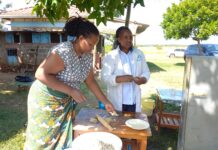By Fred Deya
A few kilometers off Sagana- Meru highway in Rukanga sub location, Kirinyaga County sits a small farm enclosed in a wooden structure. The grange hosts 34 pedigree goats that walk freely within the spacious perimeter.
The farm is a temporary home for the healthy exotic goats waiting to be exported to Djibouti, a lucrative move that could see Kenya advance its business with foreign countries in livestock sector.
The upgraded goats at Peter Maina’s farm are in a healthy condition, meeting the health threshold for export.

“It is a year now since I started rearing the upgraded goats and now I count myself lucky because my goats have been approved to be exported”, said Maina, the owner of the farm.
Peter’s farm is one of the holding grounds of the upgraded goats in Kirinyaga County.
Joseph Machira, herder at Maina’s farm said that the move to rear the upgraded goats is not regrettable but should be shown to other farmers to indulge in, saying “I also have got my own goats in this farm and I can say my life has changed. I stared with two goats then advanced to ten upgraded goats. Up to now, I have sold seven of them. 4 months old goat goes at Ksh 10000 as one year and above can be sold at Ksh 25000 at the foreign market”.
Goat breeder said that rearing pedigree goats was his best choice because of income he realizes since he started the business. He said that goats need a small space to rear as compared to cattle.
According to Macharia, six goats can take a space of a single cow. This is encouraging because a small space can be used to rear many goats with little management cost.
Kenya has for many years been a main country to export fruits and vegetables but for the first time it will advance to shipping of livestock, thanks to the collaboration of Kenya Livestock Association and Dairy Goats Association of Kenya for coming together to boost the sector.
Smallholder farmers will not only rear their livestock for domestic purposes but also aim international trade, as the first trade advancement is yet to be showcased between Kenya and Djibouti on pedigree- goat trade.

Julius Kangee, chariman of Dairy Goats Association of Kenya said that upgraded goats ranging from 10 months to 2 years dairy goats are healthy to be exported.
“We started this initiative in 1992 after borrowing idea from Germany then we bought barks then we started goat-upgrading. Goats were kept by farmers in a group of ten”, said Kangee.
Goat expert was speaking during the tour at the goat holding ground in Rukanga sub location, Kirinyaga County. Kangee added that the rearing of such goat breed is encouraging since has led to income among smallholder farmers from the County.
“The pedigree goats rearing in this area started on a high note and it goes on well with us. We were contracted by East Africa Farmers Federation (EAFF) to export the hybrid goats then we seek import permit to Kenya then we did goats selections”, said Joseph Gachingiri, Kirinyaga County director of agriculture.
Gachingiri said that blood sample was taken from all goats to test five diseases at a veterinary lab in Karatina, a test that went well on all goats.
At the moment, 34 female goats are confirmed healthy waiting to be airlifted to Djibouti come 4th April this year, according to livestock expert.
Thierry Ntambwiriza, CEO FAOapplouded the Kenya- Djibouti trade partnership that is yet to bear fruits saying, “the export of dairy goats to Djibout is not only economical advantage but as well a boost of health to rural inhabitants in Djibouti”. Thierry said that the export of upgraded, dairy goats will be as a form of smallholder farmers’ motivation, climate change effectiveness, and policy and capacity building.
FAO boss added that the initiative majorly targets pastoralists’ dropouts who are to become agro-pastoralists. He also said that the dairy goats have the capacity to produce enough milk for home consumption and for sale, thus combat food insecurity.
According to Thierry, Kenya has been the choice country to export the upgraded goats due to its verified improved breeds, capacity building approach. He also recommended Kenya because of its goat management effort that could create demand and transfer of technology.
Philip Kiriro, president EAFF said that there is high demand of pedigree goats due to farmers’ innovation. He added that the local farmers should encourage commercialization of agriculture, saying “small scale farmers in this area and in the country have the ability to do international trade”.
About 75 percent of pedigree goats have the capacity of twining. Each goat can produce a minimum of 1.5 liters depending on husbandry. Zero grazing is recommended for health purposes and goats should not be exposed to a lot of heat to avoid stress. A pedigree male goat matures up to 4 years and can weigh about 100 kilos while a female weigh 70 kilos, according Julias Kangee.














